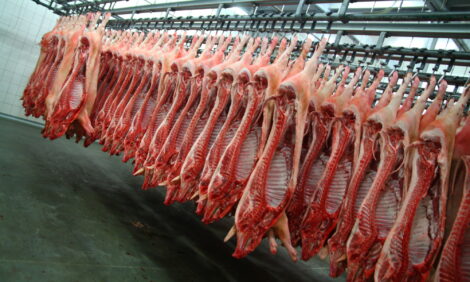



Effects of Diet Source and Vaccination for Porcine Circovirus Type 2 and Mycoplasma hyopneumoniae on Nursery Pig Performance
Research from Kansas State University has revealed that diet source and vaccination timing affect pig performance after weaning. Vaccination for porcine circovirus type 2 (PCV2) and Mycoplasma hyopneumoniae (M. hyo) independently reduced average daily gain and average daily feed intake; the effect was product-dependent.Two experiments were conducted to evaluate the effect of nursery diet sources, PCV2 and M.hyo vaccines, and vaccination timing on pig (Sus scrofa) performance, report M.L. Potter and colleagues at Kansas State University.
In their paper in Journal of Animal Science, they explain that in Experiment 1, a total of 400 pigs (5.6 bodyweight, 1.03 kg SD) were used in a 20-day study. Treatments were arranged in a 4×2 factorial in a blocked design (five pigs per pen and 10 pens per treatment), with main effects of diet manufacturing source (A, B, C or D) and vaccination timing (day 0 or 8).
On either day 0 (weaning) or day 8, pigs received two vaccines (Circumvent PCV, Intervet/Schering-Plough Animal Health, Millsboro, DE; and RespiSure One, Pfizer Animal Health, New York, NY).
A pre-determined amount of segregated early weaning (SEW) diet (0.45kg per pig) was fed followed by a transition diet until day 8 and a common diet from day 8 to 20.
Diet source affected (P<0.001) average daily gain during the first four days and affected (P<0.02) average daily gain and average daily feed intake from days 4 to 8. There were no differences (P<0.18) among diet sources once pigs were fed a common diet (days 8 to 20). Overall, diet source did not affect average daily gain but average daily feed intake tended (P=0.06) to be decreased for pigs fed Diet C compared with those fed Diets A, B and D. Pigs vaccinated on day 0 had decreased (P<0.01) average daily gain and average daily feed intake (days 4 to 8 and days 0 to 8), resulting in lighter (P=0.003) bodyweight on day 8 than those of pigs not yet vaccinated (day 8). However, overall average daily gain was not affected by vaccination timing.
In Experiment 2, 360 pigs (5.9 SD, 0.91kg bodyweight) were used in a 35-day trial to evaluate the effects of different vaccines. Treatments were arranged in a 3×2 factorial in a blocked design (five pigs per pen and 12 pens per treatment).
Main effects included PCV2 vaccine (none; CircoFLEX, Boehringer Ingelheim Vetmedica Inc., St. Joseph, MO; or Circumvent PCV); with or without an M.hyo vaccine (RespiSure, Pfizer Animal Health, New York, NY).
Overall, pigs vaccinated with Circumvent PCV had lower (P<0.02) average daily gain and average daily feed intake than CircoFLEX-vaccinated or control pigs. On day 35, pigs vaccinated with Circumvent PCV weighed less (P<0.01) than CircoFLEX-vaccinated or control pigs. RespiSure-vaccinated pigs had decreased (P<0.05) average daily gain than control pigs from days 14 to 21 and days 21 to 29. On day 35, RespiSure-vaccinated pigs tended (P=0.06) to weigh and consume less than control pigs.
These data indicate diet source and vaccination timing affects pig performance after weaning, concluded Potter and co-authors. Vaccination for PCV2 and M.hyo independently reduced average daily gain and average daily feed intake but the effect was product-dependent.
Reference
Potter M.L., E.M. Kane, J.R. Bergstrom, S.S. Dritz, M.D. Tokach, J.M. DeRouchey, R.D. Goodband and J.L. Nelssen. 2012. Effects of diet source and vaccination for porcine circovirustype 2 and Mycoplasma hyopneumoniae on nursery pig performance. J. Anim. Sci. 90(11):4063-4071. doi: 10.2527/jas.2011-3943
Further ReadingYou can view the full report (fee payable) by clicking here.Find out more information on PMWS / PCV by clicking here. Find out more information on Mycoplasma hyopneumoniae by clicking here. |
March 2013









